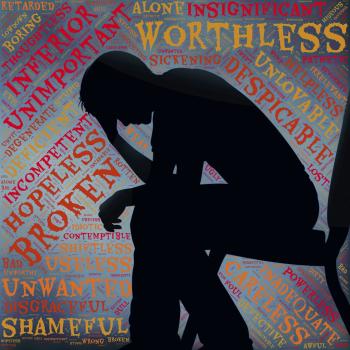
One of many things I’ve learned through the years is that I need to silence myself and listen to others and what they have to say. That is, I need to truly listen to them, to treat them as a dignified person, not an object, to truly care about them and who they are instead of what I think they should be like. I have had to learn that when they have problems, when they have issues they want me to know about, sometimes all they want is for me to acknowledge them and their problems, not someone who thinks they have the answers to everything and will try to act as their savior. Indeed, I had to accept that as I do not and cannot know everything. I will not have an answer for everything. Even if people come to me with concerns about my beliefs, about the Christian faith, or the institutional church, such as those who have suffered abuse of some kind, I have learned that the most important thing for me to do is to listen to them and acknowledge them and their concerns, for often, that is what they want more than anything else. If they want more, if they want me to explain my beliefs, or what I think about what they have told me, I let them indicate that to me, and then I will respond to them the best they can (trying the best I can to acknowledge the issues and concerns they brought to me instead of ignoring them or treating them as nothing). This is something which I believe all Christians should learn to do; instead of treating others, especially non-Christians, as objects of their evangelical zeal, seeking to convert them to the faith while ignoring their story, who and what they are as persons, they need to learn how to listen to others, to show they truly care for them and love them as persons, whether or not they are Christian.
This has been a hard lesson for me to learn. It is something which I still find difficult, as I do not have the best social skills. But I was far worse when I was much younger, such as when I was chrismated and became Byzantine Catholic. My conversion was an intellectual one, based upon intellectual discussions I had with friends, and the studies I did in philosophy and theology, leading me to believe my knowledge and understanding could and should be used to answer the questions others posed about my faith. I had the zeal of a convert wanting others to know what I knew, to believe like I believed, and I came off rather harsh in the way I treated others. I was interested in arguing and debating people, making it all an intellectual exercise, ignoring that I was dealing with people with real needs, with differences in backgrounds and experiences.
Now, to be sure, knowledge is important, and if someone wants to tap into what I have studied, wants to ask me questions which I feel I can answer, I will respond to them the best I can. However, what I have learned is that more often than not, this is not what people want or need. They do not want or need Christians to come to them as apologists or evangelists, seeking to deal with them only in relation to their lack of Christian faith; Christians who treat them in such a fashion only make them weary of the Christian faith, thinking Christians are pushy with little to no true love for others. Instead, I have learned what they want is someone to treat them as dignified person, as someone who is cared for and loved as they are. To do that, I have learned it is better to listen to them, listen to their questions and concerns, acknowledging them without acting like I am someone special, someone who alone has what they need.
What I learn I hope all Christians have or will learn for themselves. Some, I am sure, already know it, and are good listeners, people with good innate social skills, people who do not quickly judge or objectify those they engage. But, sadly, the way Christianity often is taught, Christians often think it is their duty to go out into the world and speak instead of listen, using the “Great Commission” as justification for this. And while, it is true, Christians should share their faith, the way they do it should be more through their actions than words, through love and respect rather than being judgmental and preachy. That Christians have lost their way is why no one is willing to listen or trust them, Their engagement with others is dominating and controlling, as their interaction with others is only to convert them, and if they cannot convert them, they either lose interest and move on to others (showing how little they cared for the persons they encountered), or they start becoming more controlling, more domineering, as they think they have a right to decide how others should act ( an attitude seen behind many of the culture wars and Christian nationalism).
Christians really need to learn how to love others, to truly love them, which is impossible when they treat others as mere objects of their evangelical zeal. They need to learn how to show compassion, treating others like they would like to be treated, listening to them like they would like others to listen to them. They need to stop thinking everything they are told is a challenge which requires a response from them. That is, Christians need to learn how to listen, how to engage someone with love and concern without making every conversation, especially conversations about their faith, as some sort of challenge or debate they must deal with – if they want to see it as a challenge, they should see it as a challenge to learn how to listen, to simply listen, without any other motive than loving the person who has come to talk with them. They need to learn how to listen without becoming defensive when the person they are talking to has something difficult to tell them, such as those who have experienced abuse of any kind by Christians. They need to learn what others want and need, and they can’t do that if they do not know how to be silent and listen. Sadly, as we have seen, Christians have a hard time with this; they often become defensive, and in doing so, end up gaslighting those who need love and compassion. How can those who have been abused trust other Christians when Christians are unwilling to listen to them, to acknowledge the horrors they experienced? Christians need to be willing to simply listen to those who have been hurt, show them love and compassion, and to acknowledge the effects of such abuse, letting the victims of abuse be the ones who speak and reveal what they need for healing.
Learning to listen has not been easy for me. It still is not easy. I feel it is something I must constantly challenge myself to do. I often want to say what I believe or understand after I have heard what others have to tell me. I find I must stop myself from doing that, knowing that there might be a time and place for that, but it is not when I am there to listen to what others have to say. I have learned, the more I do this, I find myself connecting with others, caring for them and loving them more than the time when I said I was loving them by giving them my response. The more I connect with others, the more I am able to appreciate them and their needs as persons in their own right, and in doing so, form a bond with them, a bond which could not and did not form when I went around thinking I had all the answers. I don’t. Nor does any Christian.
*Personal Reflections And Speculations
Stay in touch! Like A Little Bit of Nothing on Facebook.
If you liked what you read, please consider sharing it with your friends and family!
N.B.: While I read comments to moderate them, I rarely respond to them. If I don’t respond to your comment directly, don’t assume I am unthankful for it. I appreciate it. But I want readers to feel free to ask questions, and hopefully, dialogue with each other. I have shared what I wanted to say, though some responses will get a brief reply by me, or, if I find it interesting and something I can engage fully, as the foundation for another post. I have had many posts inspired or improved upon thanks to my readers.













